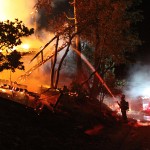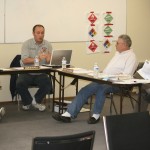Operating procedures and policies were the topic of last week’s fire commission special meeting and workshop. Commissioner Jerry Buchanan and Interim Fire Chief Mike Sherman presented draft policies, which Buchanan had received from the California Special District Association.
“Purchasing Policy” was the first policy, which the commission reviewed. In all, the commission went over 16 policies during the two and half-hour session. Sherman planned to make the amendments that came out of the workshop session and bring the revised policies to the commission for approval at its April 10 meeting.
“I’m not aware of any purchasing policy, who approves and when and how it’s approved,” Buchanan said. “It must be authorized within the budget.”
An approved purchasing policy would have likely avoided the situation the district encountered over the eventual purchase of the Zoll heart monitors in 2010, according to Buchanan.
Examples of other policies reviewed during the workshop include responsibilities for the commission’s officers — president, vice president and secretary — commission ethics, standing committees and expense reimbursements.
A new policy establishes five standing committees — finance, ordinances, personnel, planning and public relations. However the discussion at the workshop lead to agreement that citizens could be members of the committees. To which Buchanan said, “That’s democracy.”
Chief Mike Sherman shared that in his experiences at other departments he has known many individuals willing to volunteer some time, such as serving on a committee, but who were unable to contribute the amount of time that a commissioner serves.
At its Jan. 24 meeting, the commission had approved purchase of generic policies from the California Special District Association. For each policy they have reviewed, Buchanan and Chief Sherman revised the generic version to apply it specifically to IFPD and the commission.
After IFPD finishes adopting all the policies which the commission deems necessary, Buchanan encouraged his colleagues or future colleagues to review the policies every few years because of changes to state or federal laws or in case a policy is not working properly.











